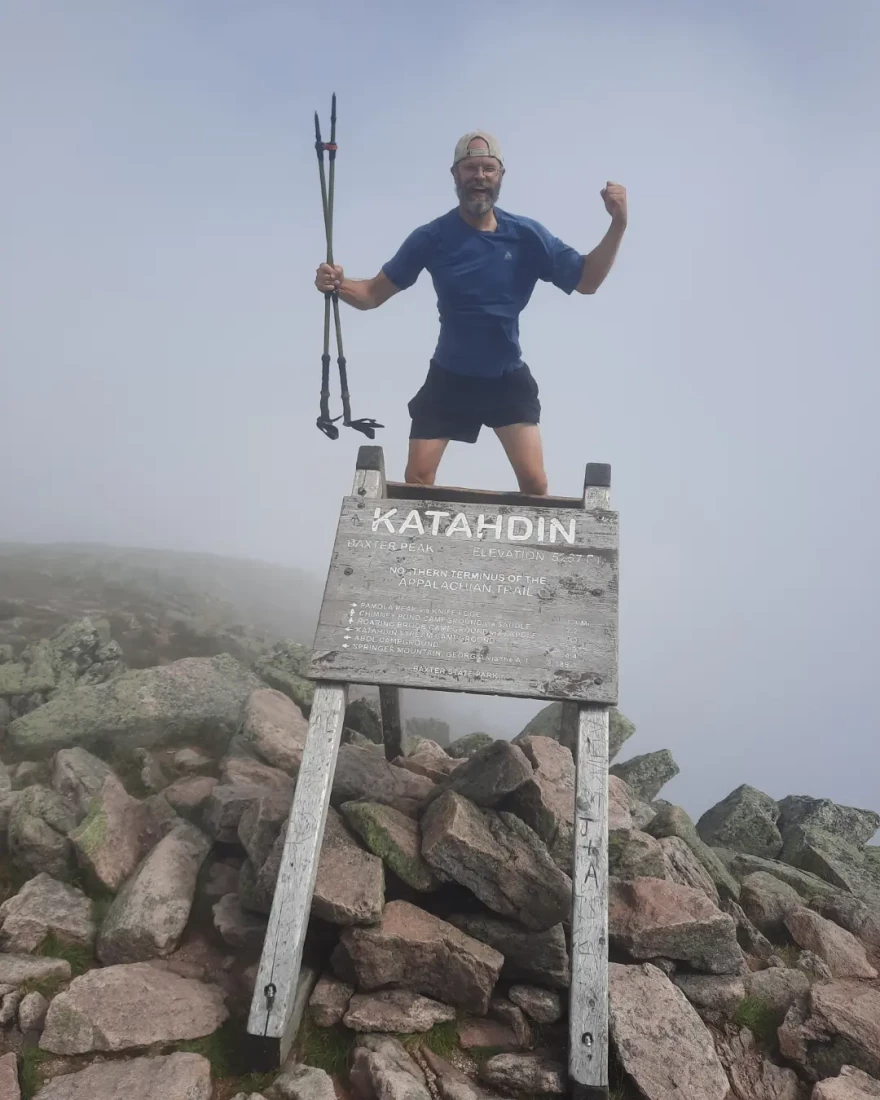Last year Jeff Mitchell found himself at a crossroads.
After spending 12 years as the Wyoming County District Attorney, he lost his reelection bid in November 2021.
“I've always been sort of on the straight and narrow path ... always doing the responsible thing of ... getting a degree and having a job and paying the bills," Mitchell said.
He contemplated reopening his law practice or getting a job in a prosecutor’s office.
“But I thought, I need to sort of widen my life a little bit and throw some curves in it," he said. "So I kind of asked my gut what I should do, and my gut said 'You need to hike the AT'."
On March 4, 2022, two weeks after deciding to thru-hike the Appalachian Trail — commonly called the AT — he found himself at Springer Mountain in Georgia at the southern start of the trek. The AT traverses through 14 East Coast states.
Mitchell finished in Maine on July 29, after hiking over 2,000 miles.
On Saturday, Feb. 11, he’s discussing his trek at the Dietrich Theater in Tunkhannock. During the free talk, he’ll share photos, videos and stories and also give practical technical advice for those interested in hiking the trail. Mitchell has published several books about his outdoor experiences in the Northeast. His books will be on sale at the presentation, which begins at 10:30 a.m. He's donating all proceeds to the theater.
Mitchell grew up in Wyoming County. As a kid, he wandered around the area’s fields and creeks. As a broke college student looking for something to do, he started hiking. He found Ricketts Glen in Benton, then he went to Worlds End State Park in Sullivan County. While at law school in Ohio, he explored more off the radar places. Now in his late 40s, Mitchell has been hiking and backpacking for years.
“So there was really no build up to it. I just showed up at the trail and started walking," he said.
New Hampshire, the second to last state on the northbound route of the AT, was the hardest part for Mitchell. It was wet, rocky and technical. He was basically rock climbing at times up steep mountainsides.
In the last three days of his hike ahead of him Mitchell could see Mount Katahdin, Maine’s tallest mountain and the official end of the trail .
“It stands by itself," he said, "it's massive.”
To get to the summit Mitchell hiked through wide-open Alpine terrain. He was climbing up boulders and rock scrambling, a method of hiking on rocks using both your hands and your feet.
“It's like an alien Alpine world," he said. "And it was ... emotional, and it was ... amazing."

At the Tioga Bistro in Tunkhannock on a Friday in February, Mitchell said post-hike he feels like a different person on a variety of levels.
After more than a decade of what he describes as dealing with political agendas, egos and insecurities, and nonsense in politics, he went into the hike cynical.
“Being ... a DA, you see the worst in people, we see the worst in society, we see crime all the time. So you know, I became jaded and by hiking the AT, the trail destroyed that."
He pointed to the division, especially within politics, and judgments within society right now.
“But on the AT that, that doesn't exist. On the trail tolerance is the baseline and that was so liberating," Mitchell said. “There was no judgment."
One thing that helped eradicate Mitchell’s cynicism is the Trail Magic he experienced. The phenomena in the hiking world is a major part of the Appalachian Trail experience.
“It really restores your faith in humanity, but not just in terms of the hikers, but just the people you run into," he said.
People in the communities along the trail will set up grills and cook for thru-hikers. Others will offer rides into town to restock on food. They will leave out snacks and drinks.
Mitchell found trail magic in Palmerton. A “trail angel” — what the trail magic makers are often called — lets thru-hikers sleep in her modest backyard, take a shower and do their laundry. The grocery store down the street gives thru-hikers free produce.
“It didn't matter who you were, where you came from … they were just going out of their way to help people," he said.
Long-distance hikers often end up with trail name, which is a nickname they pick up along the way that either describes them or a funny event they were involved in. Mitchell's trail name is Wordsmith.
Along the trail, he burned through four pairs of trail runners, a hybrid sneaker, hiking shoe. He brought his older, heavier backpacking gear which he swapped out for lighter stuff along the way. In his pack on his back, he carried a tent, sleeping bag, sleeping pad, clothing and a bottle that doubled as a water purifier. He also carried three to four days worth of food with him at a time.
Now that Mitchell is home he plans to write another book. This summer he will hike the 500-mile Colorado trail. In 2024, he’s planning another long-distance hike along the Pacific Crest Trail (PCT), which runs over 2,600 miles along the West Coast from the U.S./Mexico border to U.S./Canada border.
According to the Appalachian Trail Conservancy, only about one in four hikers make it on the trail's over 2,000 miles.
“It's something I always wanted to do but I never thought it actually would," Mitchell said. "I never thought my life would have that opportunity to actually do the trail.”
Regret was something that kept him going over his five-month trek.
“I knew I'd regret it if I didn't finish the trail," he said.
But also the adventure in front of him.
“Even on my worst days, I knew that something good was ahead and I couldn't give up," Mitchell said.


